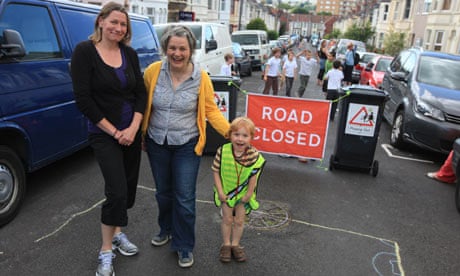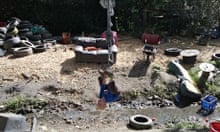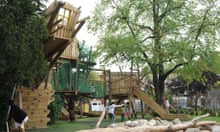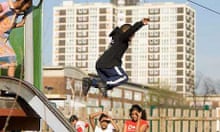Four year old Isobel is sitting on the kerb with her friend Amelie. The girls eat their ice lollies and chat, dollies and scooters lying in the street beside them. Isabel's baby brother Hugo is napping nearby in his buggy. A gang of boys comes whizzing down the road in a mass of scooters, skateboards and bikes. They deftly dodge another cluster of children, ranging in age from toddlers to pre-teens, who are busy chalking up hopscotch on the road.
It may sound like a rose–tinted scene from a bygone era, but this is a weekday afternoon in a Bristol city centre street. The young residents of Birch Road are enjoying their monthly Playing Out session and for a couple of hours the street belongs to them. Wheelie bins and road closure signs, policed by chatting mothers, keep the traffic out and the children in.
The idea of temporarily closing the road to traffic originated a few streets away when two Bristol mothers, keen to give their children a taste of the simple freedom they themselves had enjoyed growing up, decided to ask the council for a one off-closure – a kind of street party but without the party.
Alice Ferguson and Amy Rose, both mothers of two, hoped to make a point and get to know their neighbours better. Three years later, with more than 30 streets in Bristol and beyond now replicating their Playing Out sessions, and a busy website and Facebook page, they also seem to have created a movement. "Amy and I used to chat in each other's front gardens and soon realised that we shared an interest not only in play but also in the idea of children having more autonomy in their neighbourhoods," says Alice, 40, an environmental consultant who is working full-time on the Playing Out Project.
"In the short term, I wanted for Eva and Amos [now 11 and six] to be outside letting off steam, playing with who they wanted. I worried about their lives being so indoors and sedentary. In the longer term I wanted them to grow up with a sense of citizenship and belonging, able to interact with people of different ages and be part of a community. "
Alice and Amy felt sure that these ideals, at once humble and lofty, depended on each other in some way, and that the answer lay in children's right to use the space immediately around them. The wider issues were theoretical and complicated, but part of the solution, they believed was practical and simple.
Early conversations focused on physically changing the streets to somehow make them safer and more child friendly, but the pair soon realised that cost and logistics made such plans unrealistic. They had to work with what was there.
Amy, 45, a theatre director and former street performer, was used to seeing the street as more than just a traffic thoroughfare. Her suggestion was brilliantly simple, says Alice. "We'd had a street party and Amy had the idea that we could just close the road to traffic in the same way and do nothing else. It was a light bulb moment."
The plan, Amy hoped, might also help with the after-school problem she faced: What to do in those post-school and pre-teatime hours with bouncy children and next to no garden.
"There was that block of time. My daughters, Kaya, [now 11] and Jessie [seven] were mentally tired but physically buzzing. Meanwhile I was drooping. We might all troop to the park but then there would be the panic about it being supper time. I just wondered how it had worked for my mother. I didn't think she was this stressed. I wanted some way to make it all easier."
Giving the children the freedom to play safely on their own doorstep, the women agreed, would be good for all of them. Both claim that laziness as well as conscientious objection inform their reluctance to spend hours ferrying children to and from organised activities. "The idea of being able to open the front door and out they go with no hassle is so appealing," says Alice.
Moving from an idea formed over a cup of tea to the first Playing Out session was fairly easy – a form was submitted to the council and leaflets were delivered to all the houses on the street – but Amy admits they were very nervous.
"Right up to the last second we were panicking that we hadn't organised any games and weren't providing anything beyond some bits of chalk. We had to keep telling ourselves to trust the children, they would know what to do. We just had to hold the space for them. Then they came out – we didn't even realise how many children there were in our road – and just got on with it. Of course they knew what to do."
Favourite moments in three years of running the project include a game of hopscotch that stretched well into the 300s and an improvised race between a small boy and an older girl – she hopping, he driving his remote control car.
Back on Birch Road is yet more evidence that that, despite occasional doom-laden prophecies to the contrary, children have not forgotten how to play. Emmaline, seven and her friend Stephanie, nine are making chalk drawings of birds on the pavement. Afterwards, she says, they might have a race or join in some football.
"I love playing out," Emmaline says. "It is a bigger space to play and you get more time with your friends. We pretty much know all the kids on the street now because this has made it easy to meet people." Stephanie also enjoys the opportunity to show adults – who are usually "too bossy" – that children can be responsible.
For the parents on duty as stewards and those very loosely supervising younger children, that chance to stand back is welcome.
"Parenting can seem hard work. There is a lot of pressure to do it a certain way, provide constant activities," says Dominique, a mother of three visiting from a neighbouring street, who is planning to set up her own Playing Out session.
"The children just turn up and play. They can hang out with their friends, which is what they really want, and I get to have a chat. It fills an afternoon and there are enough adults that, if you need to, you can pop indoors knowing the children are safe."
Neil Adams is taking the opportunity to clean his car while his four-year-old son, Dylan, races around in a high-visibility vest with a whistle. His wife Jessica, carrying their two-week old baby Sarl, in a sling, is chatting to neighbours.
"We want Dylan to have as much freedom as possible. He enjoys being independent and this is one little way that can work in a city. I think our parenting style is called benign neglect," she says. "Dylan loves it. He gets to play football with the older children. Seeing the kids out is brilliant. It is how it should be."
Like many of the parents who support the project, Jessica says that what she wants for her children is influenced by the degree of unsupervised outdoor play she enjoyed as a child. This, explains Alice, has been a powerful force in motivating parents to engage with Playing Out. "I grew up in Bristol, not that far from where I am now. Even in the city it was quite normal to call for friends and be out playing without being watched all the time. So many of us want to bring some of that back because otherwise we just don't see how children can have the same opportunities and learn the same things."
In just one generation that free-range experience has become, in cities at least, the exception rather than the norm. So unusual is the idea of urban children playing unchaperoned in places not specifically designed for them, that exceptions are sometimes considered worthy of public attention. For example,in 2008, when Lenore Skenazy, a New York mother, admitted that she let her nine-year-old son navigate parts of the city alone, there was an international furore.
"Why has this happened?" asks Amy. "We have somehow retreated from the streets and largely given that space up to cars. We need to make streets liveable again. Town planning, out-of-town facilities and traffic have all played a part. Attitudes have changed too though. Parenting has been professionalised and too readily judged and that kills play. Parents are either blamed for being irresponsible or over-protective."
Alice, an optimist, believes things could change. "It will take time but I think we can return to seeing children as belonging in their neighbourhoods. We can't expect them to feel respect for – and pride in – their communities if we don't.
"All we want is for children to be able to play safely outside their homes. Children love their streets. With Playing Out we haven't got the solution, but we are doing something and it isn't even difficult."
On Birch Road the children are gradually drifting back into their houses – a rest in front of the television, tea time, homework all beckon. It all seems very natural and every-day. There is no sense of special occasion climax, and that, say the organisers, is exactly how it should be.
They didn't realise it when they started, but Alice and Amy have unwittingly created a child development expert's dream. "We had a play professional from the council come to one of the early sessions," recalls Amy. "She asked how we had got the children to cover so many of the different types of play. Of course we hadn't done anything at all, just followed a hunch that this kind of child-led play is what fires imagination."
It was enough to convince Bristol City Council not only to give Playing Out a grant to expand the scheme and run workshops for the many interested parents, but also to change its rules, creating Temporary Play Street Orders to close roads up to once a week if residents agree.
In fact, there have been very few objections, even from non-parents. Residents are able to drive in and out of the street during sessions (very slowly and guided by the wardens) but most do not feel the need. "We were surprised how supportive people were. A lot of older residents actually come out to help us steward and have a cup of tea which is lovely," says Alice.
On Birch Road one elderly resident arrives at the barrier in his dial-a-ride minibus. The stewards know already that he refuses to be delivered to his door. He likes to show his support for the project by walking the last few metres. On Alice and Amy's road, a local ice cream van owner arrived at the barrier to offer free ice-cream for the children. Irate motorists, annoyed at the inconvenience of diversion, are in a small minority. Instead the project seems to chime with many people who feel perhaps that something has been lost in a world where children rarely take priority over cars.
Concern that childhood is being eroded by lack of time outdoors is clearly simmering.
In April a book published in the US began to make waves on parenting websites. Playborhood, by Mike Lanza, describes his quest to make his immediate neighbourhood, in suburban California, a safe playground for his three sons. In New York, Lenore Skenazy has turned her experiences into a plea for change on her website, Free Range Kids. And in Britain, the National Trust caused a media storm in March when it reported that British children were suffering from Nature Deficit Disorder (a catchy phrase first coined by writer Richard Louv in 2005).
Alice and Amy say their children have developed and grown in fitness, confidence and resourcefulness, and have had the opportunity to make friends and get to know neighbours they might otherwise never have met.
"This is just the beginning though," says Amy. "We want to start a conversation. I don't only want my children to be able to play out between 3 and 5pm on a Monday."
Doing something is a responsibility and, she says, it is urgent. "We are the generation that actually remembers this free-range play. People under 30 don't necessarily have that. The danger is that without those memories we don't realise realise what we stand to lose. It could be now or never."
For details of the project and to find out how to set up your own session see playingout.net




Comments (…)
Sign in or create your Guardian account to join the discussion